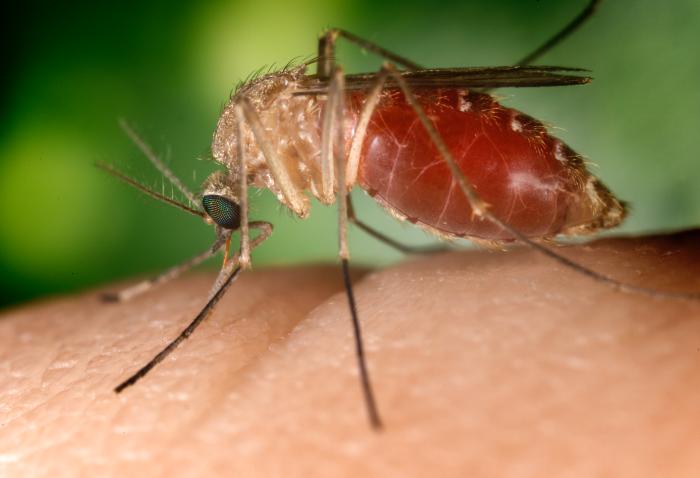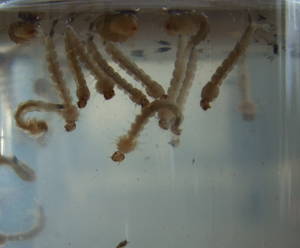Mosquitoes - Why do they find you so attractive?
Interview with
Chris - James, let's talk abut your work on mosquitoes. It sounds a bit frivolous talking about mosquito bites but in the grand scheme of things mosquitoes are probably the most dangerous animals, aren't they?
 James - Quite possibly, yes. It's not actually the mosquitoes that cause the problem although they bite and people react differently to their bites. You can have quite a severe allergic reaction to the bites. It's actually the pathogens that they carry; the diseases they carry such as malaria, dengue fever, filariasis. There's a whole number of diseases that they carry and, of course, those are the diseases that cause the problem.
James - Quite possibly, yes. It's not actually the mosquitoes that cause the problem although they bite and people react differently to their bites. You can have quite a severe allergic reaction to the bites. It's actually the pathogens that they carry; the diseases they carry such as malaria, dengue fever, filariasis. There's a whole number of diseases that they carry and, of course, those are the diseases that cause the problem.
Chris - There's something like 300,000,000 cases of malaria every year, 3,000,000 deaths. It's a huge number.
James - That's right. Exactly, almost 2,000,000 people die every year.
Chris - So understanding what lures them to us is crucial in being able to tackle that problem head-on because we know that just spraying them doesn't work.
James - Yes, the more we understand about finding them in the first place the better we can develop control methods to stop that from happening.
Chris - Those few hundred chemicals that you were telling Ben ooze out of our skin and that mosquitoes are sensitive to (at least to some of them): what actually are those chemicals and what are they doing?
James - Well, there's a whole range of chemicals that mosquitoes respond to. The main chemical they respond to is carbon dioxide which is mainly given off by our breath but is also released through our body as well. Other chemicals such as 1-octen-3-ol which is also given off as an alcohol, it's given off in our breath, and certain acids as well which are found in quite high amounts on your feet. These types of chemicals are very attractive to mosquitoes. Ammonia is another one as well.
Chris - Are they just naturally produced by cells in the skin and the mosquitoes have learned that this equals lunch so they home in on them?
James - Absolutely, yeah. The mosquitoes have learned that some chemicals are released through the skin. Other chemicals are actually produced by the bacteria on the skin. So bacteria do play a very big role and they sort of convert the chemicals into more volatile chemicals that the mosquitoes find attractive.
Chris - How do you do the research where you take a person and then look at what's coming out of them to work out how they're attractive, whether they're attractive or not and also what those chemicals are that are doing that?
James - We use quite a bizarre technique. We place people inside large silver bags, thermal survival bags that are commonly used for mountaineering. They lie in there for two hours and we extract their body odours from the bag.
Chris - Could be bad!
James - Yeah. We trap the chemicals onto a filter and strip the chemicals off the filter which then gives us a liquid extract that we can analyse. We have all sorts of weird techniques whereby we can actually look at the response of the receptors on the antenna of the mosquito, which is its nose, to detect which chemicals the mosquito responds to in this complex mixture.
 Chris - So, the chemicals that mosquitoes respond to: are they only attracted to us because some of the people that were in Kitchen Science with Ben were not attractive. You were very attractive, he wasn't attractive. Is it just that he's got less of these chemicals or is he making something else that's in fact making mosquitoes go away?
Chris - So, the chemicals that mosquitoes respond to: are they only attracted to us because some of the people that were in Kitchen Science with Ben were not attractive. You were very attractive, he wasn't attractive. Is it just that he's got less of these chemicals or is he making something else that's in fact making mosquitoes go away?
James - It might be quite logical to assume that if you weren't attractive to mosquitoes then you just simply lack the attractive chemicals but of course we all breathe. We all release carbon dioxide and these other very attractive chemicals. There is something special about people who seemingly never get bitten and what we've found is that those people are producing certain chemicals in much higher concentration. When tested those chemicals have a repellent effect so it's almost as if your body's got a natural defence systems against these insects.
Chris - If you test people who live in areas where there are more mosquitoes that spread diseases (I'm thinking of places like Africa where malaria's endemic and other diseases like that) do you find that the population naturally make more of these chemicals?
James - That's a really good question and you probably would expect that in a place such as Africa where the selection pressure would be quite high. At the moment we don't actually know. There was a study that was done fairly recently that showed 20% of the population in a township were most susceptible to contracting malaria. The other 80% seemed to be fairly protected. The authors suggested that this could be to do with those people producing repellent chemicals but nobody actually knows. We haven't done a big enough study to be able to tell that.
Chris - There was a paper, I think it was published in Plos a couple of years ago. It was very interesting because they took children from the local school that had malaria and they put them at one end of a piece of apparatus and they had children who were malaria-free and put them at the other end of the apparatus. Then they put the mosquitoes in the middle and counted where the mosquitoes went. When the child was highly infectious for malaria all the mosquitoes flocked towards the malaria-ridden child. When they repeated the experiment with mosquitoes that were themselves malaria positive they avoided the child with malaria and went to the people that didn't have malaria. How are they doing that?
James - Again that was a really interesting study. What it showed was that it wasn't to do with things like body temperature and things like that. We know that mosquitoes are attracted to heat and to moisture. When you have malaria you do have a fever and so you're very hot. Some people might think that's the reason. These scientists actually showed that it was all to do with body odours. So your body odour was changing and the point at which the parasite was most transmissible between the human and the mosquito was the point at which they were most attractive. Quite incredible.
Chris - It is incredible.










Comments
Add a comment